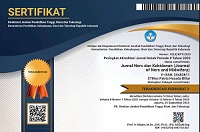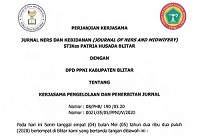Edukasi Prenatal dalam Upaya Peningkatan Brestfeeding Self Efficacy
DOI:
https://doi.org/10.26699/jnk.v3i2.ART.p136-141Keywords:
Prenatal Education, Breastfeeding Self EfficacyAbstract
The percentage of exclusive breastfeeding will be decreased in line with the raise of baby’s age. The primary factors that make mothers do not give or stopped exclusive breastfeeding are the lack of breastfeeding self efficacy so that mothers feel that they do not have enough breastfeed for their baby. The aim of the research was to find out the effectiveness of ASI prenatal education toward breastfeeding self efficacy. The research design was post test only control group design. The population was all pregnant women in the third trimester of Puskesmas Kepanjen Kidul Kota Blitar. The sample was 40 taken by purposive sampling and divided into treatment group and control group by simple random sampling. The treatment group was given education on ASI and lactation on pregnancy period. Education was completed by presenting mothers who had been succeed in giving exclusive breastfeeding (giving testimonial) to share their experience in giving breastfeed. After that, all respondents breastfeeding self efficacy level were measured with BSES-SF in between the second day until 2 weeks of postpartum. The result showed that the average score of breastfeeding self efficacy of treatment group was 61,15±5,566 and the control group was 49,85±9,438. The data analysis by independent t test showed that there was an effect of prenatal education toward breastfeeding self efficacy(p=0,000, ï¡<0,05). It was expected that prenatal education on lactation which presented the breastfeeding testimonial were given during the pregnancy period in order to enhance mothers’ breastfeeding self efficacy.References
Aisah, S., Junaiti S., Sutanto P.H. 2010. Pengaruh Edukasi
Kelompok Sebaya Terhadap Perubahan Perilaku
Pencegahan Anemia Gizi Besi pad Wanita Usia
Subur di Kota Semarang. Prosiding Seminar
Nasional Unimus. 119-127.
Britton, J., & H. Britton. 2008. Maternal Self Concept and
Breastfeeding. Journal of Human Lactation, 24,
-438.
Citrawati, N.K. 2015. Pengaruh Pendidikan Kesehatan
Masyarakat laktasi terhadap Tingkat Pengetahuan
dan Self Efficacy Ibu Menyusui. Tesis. Electronic
theses and dissertations Gajah Mada University.
Yogjakarta.
Dennis, C.L. 2003. The Breastfeeding Self-Efficacy Scale:
Psychometric Assessment of the Short Form.
JOGNN, 6, 734-744.
Efendi, F., & Makhfudli. 2009. Teori dan Praktik dalam
Keperawatan. Jakarta: Salemba Medika.
Eidman, C.K. 2011. Enhancing Breastfeeding Self-Efficacy
through Prenatal Education. Master of Art
in Nursing These, 31.
Febriana, N.A. 2014. Faktor-Faktor yang Berhubungan
dengan Self Efficacy Menyusui di Ruang
Bougenville 2 RSUP DR.Sardjito Yogjakarta.
Skripsi. Electronic theses and dissertations Gajah
Mada University. Yogjakarta.
Kurniawan, B. 2013. Determinants keberhasilan pemberian
air susu ibu eksklusif. Jurnal Kedokteran
Brawijaya, 27(4), 236-240.
Nekavand, M., Hoorsan R., Kerami A., Zohoor A. 2014.
Effect of Exclusive Breast Feeding Education on
Breast-feeding self Efficacy and maternal Stress.
Research Journal of Obstetrics and Gynecology,
(1), 1-5.
Puspita, Y.A. 2015. Perbedaan Persepsi Kontrol Diri Ibu
Hamil Terhadap Intensi Ibu Untuk Memberikan
ASI Eksklusif Pada Kelas Ibu Hamil Plus di
Puskesmas Muara Teweh Kabupaten Barito
Utara. Jurnal Edu Health, 5(2), 123-130.
Ramawati, D., Lutfatul L., Eni R. 2013. Efektifitas Modul
untuk Manajemen laktasi pasca melahirkan. Journal
keperawatan soedirman, 8 (1), 49-55.
Riset Kesehatan Dasar (Riskesdas). 2013. Badan
Penelitian dan Pengembangan Kesehatan
Kementerian Kesehatan Republik Indonesia.
Roesli, U. 2007. Mengenal ASI Eksklusif. Jakarta: Trubus
Agriwidya.
Saleh A., Nurachman E., As’ad S., Hadju V. 2009.
Pengaruh Pendidikan Kesehatan dengan
Pendekatan Modelling terhadap Pengetahuan,
kemampuan Praktek dan Percaya Diri Ibu dalam
Menstimulasi Tumbuh Kembang Bayi 0-6 Bulan
di Kabupaten Maros. Tesis. Universitas
Hasanudin Makasar.
Thulier, D., Mercer, J. 2009. Variables associated with
breastfeeding duration. Journal of Obstetric,
Gynecologic and Neonatal Nursing 38, 259-268.
doi: 10.1111/j.1552-6909.2009.01021.x
Wardani, M.A. 2012. Gambaran tingkat Self-Efficacy
untuk Menyusui pada Ibu Primigravida. Skripsi.
Depok: Fakultas Ilmu Keperawatan. [Tidak
diterbitkan].
Downloads
Published
How to Cite
Issue
Section
License
Copyright (c) 2016 Jurnal Ners dan Kebidanan (Journal of Ners and Midwifery)

This work is licensed under a Creative Commons Attribution-ShareAlike 4.0 International License.






